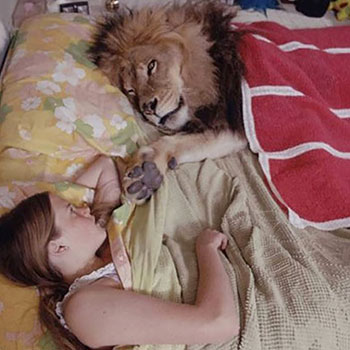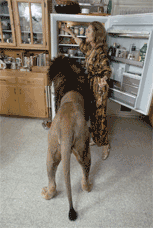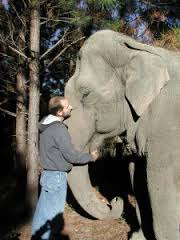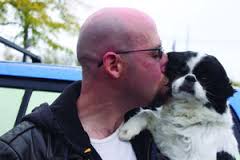Just Say 'No' To Big Cats
Tippi Hedren, Shambala Preserve
Actress Tippi Hedren (The Birds) is back to talk about the big cats at her sanctuary and legislation to stop the breeding of lions and tigers. She comes clean about her daughter's (actress Melanie Griffith) relationship with "Neil" the lion.
Neil was a working lion and his trainer would bring him to Tippi's house now and then so they could get an idea of what they're like. The trainer didn't pull any punches and let them know that they are dangerous animals.
 You can find pictures of when Melanie was a teenager in the 70's hanging out with Neil the lion. There are pictures of Neil in her kitchen, playing with Griffith by the pool and peering into the fridge, as well as sleeping with Melanie in her bed.
You can find pictures of when Melanie was a teenager in the 70's hanging out with Neil the lion. There are pictures of Neil in her kitchen, playing with Griffith by the pool and peering into the fridge, as well as sleeping with Melanie in her bed.
At the time, Tippi was just learning about these animals, but says the press made it sound like Neil was living with them. Tippi stated that it was all photo opportunities and the Neil never spent a night at their house.
This process of learning about the animals was for the movie Tippi was filming called "Roar." Because of the length of time it took to do the movie, she became terribly aware of the fact that these animals were being bred and sold in the United States for financial gain.
The film Roar took five years to make and there were seven different accidents, with a couple of them happening during the filming. Tippi herself was hurt; her daughter Melanie had her face scratched; and their director of photography was almost killed by one of the lions. She said it was frightening at times. She then became more and more aware of situation, and after the film was over, she started working on bills to stop this insanity.
 The Big Cats and Public Safety Protection Act prohibits private possession of big cats except at highly-qualified facilities, like accredited zoos, where they can be properly cared for and restrained. The bill requires any persons who currently possess big cats to register those animals with USDA in order to keep the cats they currently own. Additionally, and perhaps more importantly, the bill also outlaws the breeding of any big cat except at accredited zoos or educational institutions. Violators of the law will have their animals confiscated along with any vehicles or equipment used to aid in their illegal activity, and could face stiff penalties including fines as much as $20,000, and up to five years in jail.
The Big Cats and Public Safety Protection Act prohibits private possession of big cats except at highly-qualified facilities, like accredited zoos, where they can be properly cared for and restrained. The bill requires any persons who currently possess big cats to register those animals with USDA in order to keep the cats they currently own. Additionally, and perhaps more importantly, the bill also outlaws the breeding of any big cat except at accredited zoos or educational institutions. Violators of the law will have their animals confiscated along with any vehicles or equipment used to aid in their illegal activity, and could face stiff penalties including fines as much as $20,000, and up to five years in jail.
There are so many people, along with breeders, who didn't want this bill passed because it cuts out their livelihood. Breeding big cats is a huge business and the government doesn't like to stop a business that is huge. According to the U.S. Fish & Wildlife, it is on par with illegal drugs.
To anyone who wanted one of these animals as a pet, Tippi would personally tell them, "Absolutely no!" She would tell them about their personalities and even deeper, the instinctual dictates of these animals to take out any animal that is sick, old or lame. They will also do the same to people.
When asked if Tippi could go back and do things differently with these animals, would she change a thing? She states that hindsight is really amazing, but she feels that it was her destiny to start the Shambala Preserve. She was supposed to do this in order to raise the awareness of these animals in captivity.
The Shambala Preserve is located just outside of Acton, California. Tippi states she currently has many big cats. They consist of lions, tigers and mountain lions, as well as some of the lesser cats. All of these cats were born in the United States to be sold as a pet, which Tippi states is an unconscionable act to breed these animals to be sold to people who don't know what they are like. She says they are literally, "Serial Killers."
Visit Website
"HERO PEOPLE OF THE WEEK" - Scott Blais - Transforming The Lives of Captive Elephants
 This week's Hero Person is rescuing elephants from circuses and zoos. Often mistreated, the gentle giants are exploited for our entertainment and most people simply don't know what elephants endure. Scott Blais Skypes with us from Brazil, where he has been rescuing elephants.
This week's Hero Person is rescuing elephants from circuses and zoos. Often mistreated, the gentle giants are exploited for our entertainment and most people simply don't know what elephants endure. Scott Blais Skypes with us from Brazil, where he has been rescuing elephants.
Scott Blais previously co-founded The Elephant Sanctuary in Tennessee and started an organization that he co-founded to help build sanctuaries for elephants internationally. When we talked to him, he was in Brazil working to launch South America's first expansive natural habitat sanctuary for captive elephants, the Elephant Sanctuary Brazil.
In the United States, there are presently a handful of municipalities that have banned performing exotic animals. Los Angeles, California passed a ban on the use of Bullhooks and Oakland, California did the same. But, the U.S. is far behind the curve with respect to protecting performing animals.
In South America, there are seven countries that have banned performing elephants and there is nowhere for them to go.
Elephants are not native to South America and have all been captured from either Africa or Asia, most in their infancy and taken from their families. These babies were then put into the entertainment industry.
You would think since these animals make money for their owners, that they would be treated well. However, Scott advises that the truth is grim and quite tragic.
Scot's first involvement with elephants was in a safari park. He was told that this was the 'best of the best' type of facility for elephants. Scott quickly learned that much was lacking. These elephants had a really tragic life and it wasn't until he started the sanctuary in Tennessee in 1995, and a few years later, when the elephants started recovering from ailments as a result from captivity, when he started realizing just how deep the abuse and neglect really runs. Scott states that, "Just every facet of their life is pretty much destroyed by captivity and no matter how hard you try in a zoo or circus, you just can't do right by them. There is no way possible to get them what they need in those environments."
The elephants react very differently when released into the sanctuary. While some may become integrated into the existing herd in less than 12 hours, others may struggle for a while.
Zoo elephants seem to struggle more than circus elephants, because of the sterile lives that they've lived. Most of them have only lived in that box of a world for 25 or 35 years. One elephant had lived alone for 40 of her 47 years, and she integrated into the herd literally overnight. While there are others that had been bounced around from one zoo to another and they struggled for weeks to try to find comfort in the new environment. Once that starts and they realize that they have autonomy, giving them their choice and watching them learn how to control their own lives, it's miraculous what ends up transpiring.
Scott has been working with elephants for more than 30 years. When asked what the most amazing thing about elephants was, Scott replied, "There is no way to put it into a nutshell. It is literally everything about them. It is their sensitivity, their acute awareness, their just sense of knowing. They just seem to have an understanding of life that we always strive for. They are just remarkable all the way around."
Visit Website
 Know a Kid That Wants To Be a Vet? Check out Boiler Vet Camp - Dr. Debbie
Know a Kid That Wants To Be a Vet? Check out Boiler Vet Camp - Dr. Debbie
Do you know a young budding veterinarian? If so then I've got a summer camp that will beat hanging out by the pool, will top playing summer baseball and will even trump a vacation at the lake. Boiler Vet Camp is an educational, fun-filled camp for kids that have interests in becoming a veterinarian or veterinary technician. Kids are exposed to laboratories, demonstrations, tours, and hands-on experience as they learn the varied roles and opportunities in veterinary medicine.
What is Vet Camp About?
Each summer Purdue's veterinary school holds two separate week long vet camps that give kids an inside peek into veterinary medicine. Junior vet camp is for kids due to enter 8th and 9th grades and Senior Vet Camp is for students entering 10th through 12th grades. Camp attendees spend a week living in a college dorm, get hands-on experience with animals, and learn about modern veterinary medicine.
Junior camp attendees learn about various animal species, while Senior Vet Camp attendees focus their efforts on small animal medicine and surgery. Just a few of the activities in Junior Vet Camp included observing a horse treadmill session used to evaluate its breathing, dissecting organs, visiting a dairy farm, learning about dog blood banks, watching a post-mortem exam, handling piglets at a pig farm, learning about a zoo vet's day at the Indianapolis Zoo and much more. At the end of the week the students give a presentation on a veterinary case that they solved. Also on the last day of Vet Camp, the attendees were recognized for their week of learning and received a certificate of completion along with an official Vet Camp doctor's lab coat.
 The list of activities had me wishing they had this camp when I was a kid. Who wouldn't like giving a cow a pill, peering at blood samples on a microscope or dissecting a fish's innards! If you know a kid that likes science and is attracted to veterinary medicine, then I can highly recommend the Purdue Vet Camp experiences.
The list of activities had me wishing they had this camp when I was a kid. Who wouldn't like giving a cow a pill, peering at blood samples on a microscope or dissecting a fish's innards! If you know a kid that likes science and is attracted to veterinary medicine, then I can highly recommend the Purdue Vet Camp experiences.
How to Sign Up?
You should know that competition is tough to gain acceptance into Vet Camp. Prospective attendees must submit an application which includes an essay. There is a fee for the Junior Camp and Senior Camp. Financial aid is available as well.
For science minded kids that have their sights on a career in veterinary medicine…the Purdue Vet Camp experience is an absolute "must do".
For more information on Purdue Vet Camps visit the Purdue website at Boiler Vet Camp.
Featured veterinarian known as "Dr. Debbie" on national pet radio program, Animal Radio. Ebook author of "Yorkshire Terriers: How to Be Your Dog's Best Friend"; "Pugs: How to Be Your Dog's Best Friend"; "Mini Schnauzers: How to Be Your Dog's Best Friend"; and "Shih Tzu: How to Be Your Dog's Best Friend." Dr. Debbie's books.
Visit Website
Animal Radio News with Tammy Trujillo
 Body Art Is Not For Animals
Body Art Is Not For Animals
Body art is not for animals, at least not in New York. It is a crime throughout the state to pierce or tattoo a companion animal. There is an exception for marking one under a veterinarian's supervision for a medical reason or identification, and then those tattoos can only be numbers and letters specifically for a tattoo identification registry. The law also doesn't apply to ear tags on rabbits and guinea pigs. Penalties for violations range up to 15 days in jail and fines up to $250. Several other states have similar laws. Interestingly, the laws were prompted by people showing off what they did to their animals on the Internet including a woman who was piercing kittens and selling them as 'gothic' and a tattoo artists who shoed off his dog's tattoo saying he did it after the dog had surgery and was still under anesthesia.
Fines For Leaving Dog Out In The Cold
Most of us would not think of leaving our pet out in the freezing cold of winter. In the city of Pittsburgh, it is illegal to tether dogs and leave them outside or unattended for more than a half-hour if the temperature falls below 32-degrees or goes above 90-degrees. There's a $500 fine and the dog could be taken from the person. The law goes further regulating the type of tether and making sure that dogs have easy access to shelter, food and water when they're outside.
 Pet Owners Get Emotional Distress Award in Shooting of Pet
Pet Owners Get Emotional Distress Award in Shooting of Pet
This appeals court action was heralded as a possible turning point for pet guardians. The Maryland Court of Appeals ruled that a jury can award damages to pet owners for the emotional distress they suffer following the injury or death of a beloved animal due to gross negligence. The Court let stand a $200,000 award to Roger and Sandra Jenkins of Taneytown. A Frederick County sheriff's deputy shot their Labrador retriever when he went to their home to serve an arrest warrant on their son, with the dog surviving. Their attorney praised the court for moving past the outdated concept that pets are valuable family members instead of property to be owned and replaced.
Pets Can Give You A Tax Break
It's still a few months off, but we'll all soon start thinking about filing our income tax returns. And in some cases, your pets can help you out! If you have a cat, they're always ready to help you sort receipts, but I mean help with the bottom line. If you foster an animal, you can deduct some of the associated costs. Things like vet bills, food, grooming; they qualify as charitable donations, which are deductible up to 50-percent of your adjusted gross income. But once you officially adopt the animal, that animal is no longer considered a foster, so you will lose the deductions. You can also deduct the expenses associated with a guard dog that is used to protect your business and inventory. And if you need a pet for medical reasons, there are deductions available there too. To meet the IRS standards, the animal has to be trained and certified as a service animal.
How Much Would You Spend On Your Best Friend? 
For a man in Pittsburgh there apparently was no cost to high when it came to saving his little 8-year-old Japanese Chin, that is the name of the breed, a Japanese Chin dog. Esme needed open heart surgery to correct a problem with his mitral valve. M. Dylan Raskin spent $32,000 on a special surgery and even flew in an expert veterinarian from Japan to do the procedure. And apparently Mr. Raskin was not alone; he said pet owners from all over the world contacted him wanting to be put in touch with the Japanese Vet to see if he could help their pets as well.
 Listen to the entire Podcast of this show (#1263)
Listen to the entire Podcast of this show (#1263)





